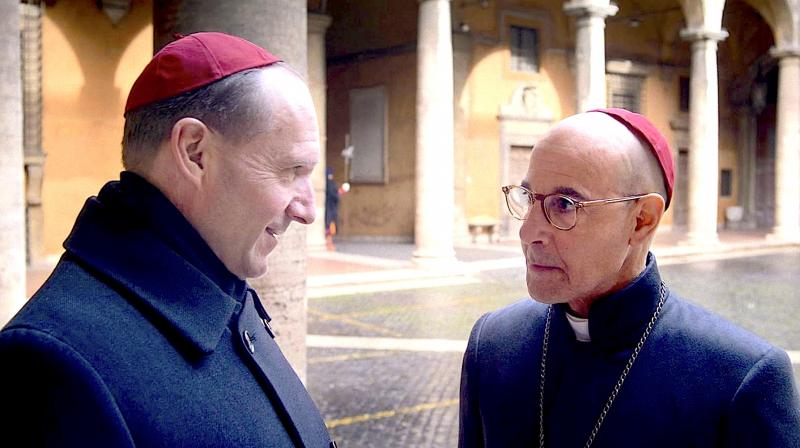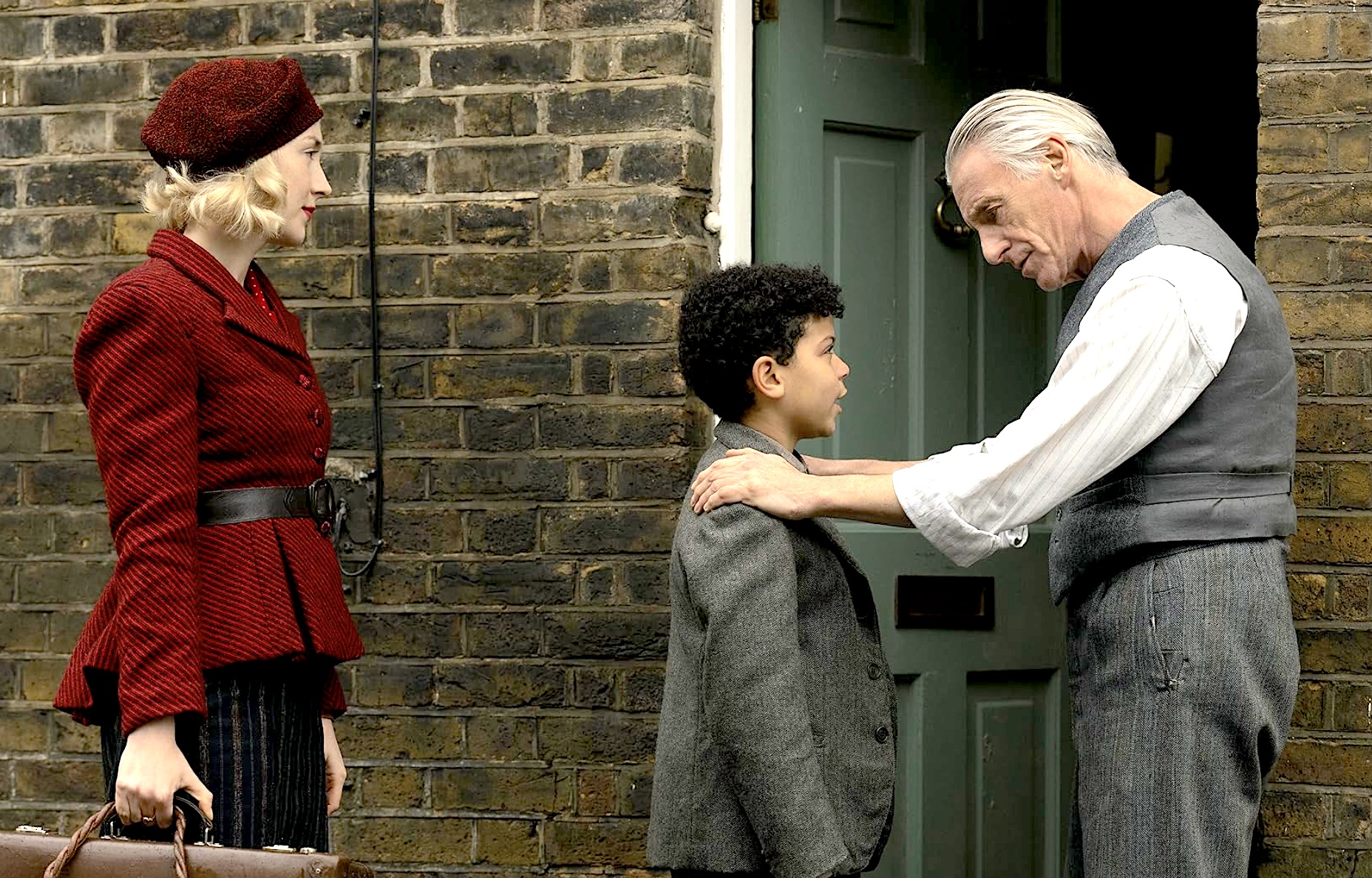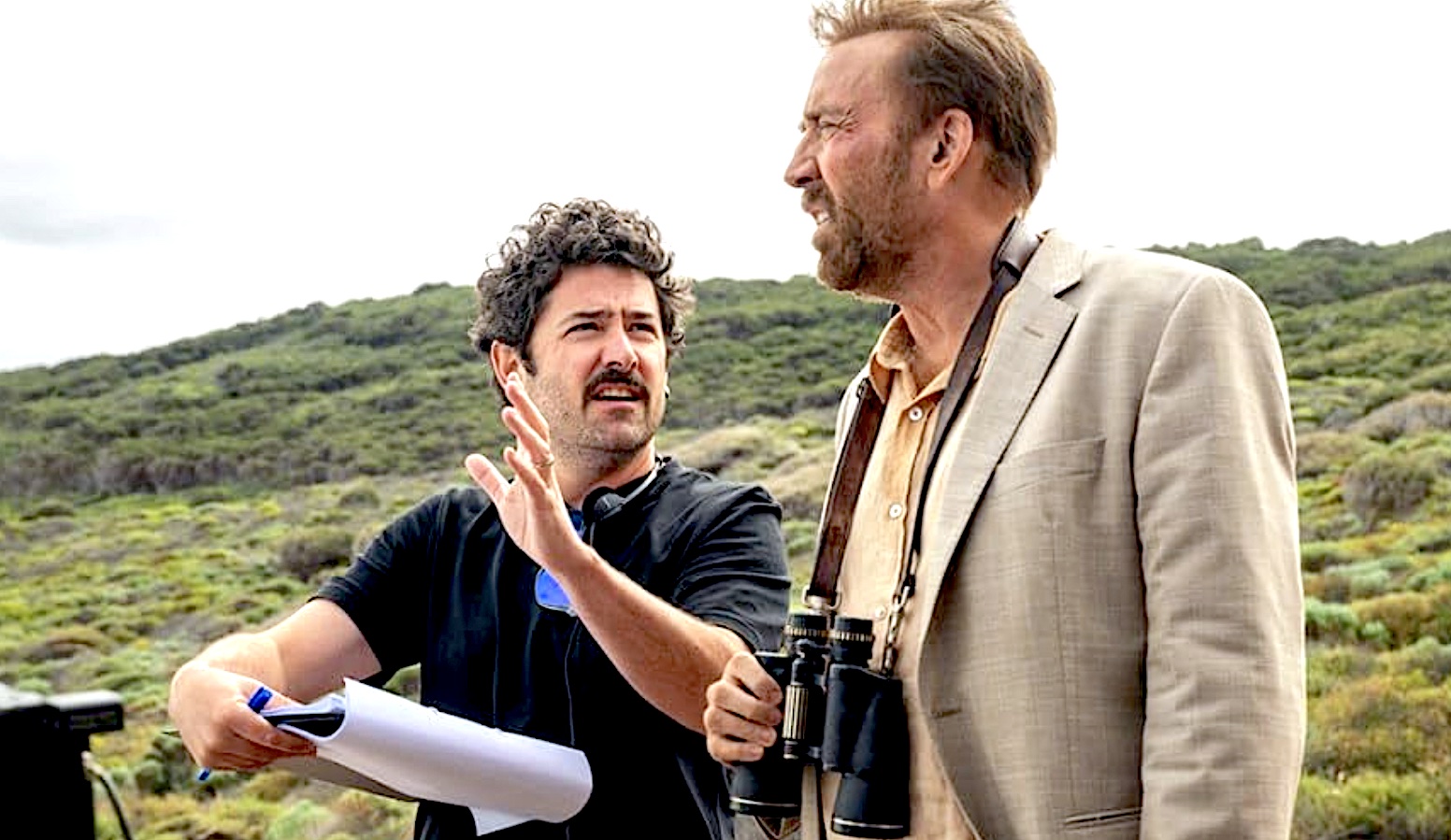London Film Festival 2024 – the Vatican, the Blitz, a trip to Poland and a surfin' nightmare | reviews, news & interviews
London Film Festival 2024 – the Vatican, the Blitz, a trip to Poland and a surfin' nightmare
London Film Festival 2024 – the Vatican, the Blitz, a trip to Poland and a surfin' nightmare
Another cinematic feast as LFF '24 gets underway

Conclave
Director Edward Berger won an Oscar for his last feature, All Quiet on the Western Front (2022), but here he concerns himself with the more intimate and claustrophobic battlefield of the Vatican. The Pope (Bruno Novelli) has died, and under the watchful eye of the Dean, Cardinal Lawrence (Ralph Fiennes), the cardinals gather to appoint his successor. No-one said it would be easy.
The opulent gloom and aura of centuries-old secrecy that swathe the Holy City provide fertile soil for this tale of clandestine machinations and carefully camouflaged lust for power (Berger and screenwriter Peter Straughan have derived their story from Robert Harris’s novel), and the intricate manoeuvrings are subtly expressed by an expert cast of wily veterans.
Fiennes is magnificent, helming the arcane voting process with a pained and regretful sobriety, but always keeping his antennae alert for any hint of sharp practice. He is tested in several ways, not least he when he gets wind of the notion that one of the front-runners in the race, Cardinal Tremblay (a deliciously untrustworthy John Lithgow), may not be playing with a straight bat.
There’s expert work, too, from Stanley Tucci as Cardinal Bellini. “No sane man would want the Papacy,” he declares, but you believe anything this lot tell you at your peril. As the voting process proceeds through its various chess-like stages, marked by those fabled puffs of Vatican smoke, Fiennes must navigate crises of faith, hidden stashes of dramatic documents and the threat of terrorist outrages being committed beyond the sequestered vacuum of the conclave. Berger ratchets up the drama like an expert angler playing his catch, assisted by Stéphane Fontaine’s imaginative cinematography and Volker Bertelmann’s tension-tightening score. Terrific!
 Blitz
Blitz
You wouldn’t have pictured the creator of 12 Years a Slave or Widows as a sentimentalist, but he looks suspiciously like one in this opulent World War Two saga. Set amidst the terrors of the Luftwaffe’s bombing campaign over London in 1940, Steve McQueen’s film is driven by the bond between Kate (Saoirse Ronan) and her young son George (Elliott Heffernan, pictured above with Ronan and Paul Weller), and how it’s put to the test when George is evacuated to the safety of the countryside.
Kate is pierced to the heart by George’s piteous plea – “please mum, don’t send me away” – and George won't be denied. As the evacuees’ train huffs its way through nostalgically green and wooded English scenery, he seizes his chance to leap to freedom and make his way back to his home in Stepney (where Paul Weller delivers a quietly effective turn as his grandad, Gerald.) His journey becomes a kind of pilgrim’s progress as McQueen uses it to explore the way the war affects various strata of society, though this somewhat formulaic approach means the film lacks a consistent narrative focus.
Kate and her fellow working-class women are working in an armaments factory, while at night the population heads for the safety of local Underground stations as Heinkels drone overhead. The film’s most riveting set-piece is a scene where the river Thames bursts torrentially into London Bridge station, promoting a panic-stricken scramble for survival.
George’s journey finds him falling into the clutches of a bunch of scavenging thieves, headed by Stephen Graham’s Albert and his sidekick Kathy Burke, and mixed-race George gets educated about racist attitudes by a benevolent Nigerian air-raid warden, though McQueen’s DEI agenda feels historically premature here. Blitz is, perhaps, less than the sum of its ambitions.
 A Real Pain
A Real Pain
Written and directed by Jesse Eisenberg, A Real Pain is a bittersweet comedy about two Jewish cousins, Benji (Kieran Culkin) and David (Eisenberg, both pictured above), who take a trip to Poland in memory of their beloved grandmother, a Holocaust survivor. It’s rooted in Eisenberg’s own Polish background, and beneath the wisecracks and one-liners there’s a subtle and penetrating analysis of family bonds and the burden of shared history.
While Eisenberg’s is a quiet, watchful role, Culkin gets to charge through the gears as Benji. Some of the time he’s a babbling extrovert who effortlessly dominates any social gathering, for instance persuading everybody in their touring party to pose for selfies on a statue commemorating the Warsaw Uprising, but the flipside is that he can’t tell where the boundaries are. One moment everybody loves him, then suddenly he’s become an insufferable asshole. Fortunately their travelling companions show superhuman patience, including tour guide James (Will Sharpe), who graciously accepts Benji’s critique of his guiding technique.
The film’s underlying sadness stems from its gradual revealing of how the cousins have lost their previous closeness, with David living a successful life in New York with his family while Benji has been struggling to keep himself on the rails. It’s a clever, complex piece, but Eisenberg has made it look breezily simple.
 The Surfer
The Surfer
Like the Beach Boys’ surfin’ safari being dragged into hell, this Australia-set thriller, directed by Lorcan Finnegan, revolves around Nicolas Cage as the nameless protagonist in a story of macho manhood and psychological disintegration (Finnegan and Cage pictured above). Cage’s character is enduring a midlife crisis, as he learns that his ex-wife is newly pregnant and about to marry again, and he’s determined to re-purchase the seaside house in which he grew up. He yearns to relive his youth and take his teenage son surfing.
However, his cherished idyll is slipping from his grasp as a rival buyer outbids him, and a cult-like gang of local surfers, the Bay Boys, systematically terrorise him. They’re led by Scally (Julian McMahon), a bullying male supremacist (with hilariously perfect white teeth) who tells Cage’s character that the loss of his father at an early age has left him weak and useless. “You can’t surf if you don’t suffer,” he advises sagely.
A low budget means that Cage is condemned to spend virtually the whole running time stranded in a clifftop car park, as he becomes steadily more unkept and deranged, surviving on garbage and eyed suspiciously by the local wildlife (a rat has a striking walk-on role). Still, he throws himself into it with typically Cage-like intensity until it all blows up into a climactic mini-apocalypse. Bizarre but strangely watchable.
Subscribe to theartsdesk.com
Thank you for continuing to read our work on theartsdesk.com. For unlimited access to every article in its entirety, including our archive of more than 15,000 pieces, we're asking for £5 per month or £40 per year. We feel it's a very good deal, and hope you do too.
To take a subscription now simply click here.
And if you're looking for that extra gift for a friend or family member, why not treat them to a theartsdesk.com gift subscription?
more Film
 London Film Festival 2024 – the Vatican, the Blitz, a trip to Poland and a surfin' nightmare
Another cinematic feast as LFF '24 gets underway
London Film Festival 2024 – the Vatican, the Blitz, a trip to Poland and a surfin' nightmare
Another cinematic feast as LFF '24 gets underway
 Timestalker review – she's lost control again
Alice Lowe directs herself as a woman pursuing the wrong dude, century after century
Timestalker review – she's lost control again
Alice Lowe directs herself as a woman pursuing the wrong dude, century after century
 theartsdesk Q&A: Alice Lowe on 'Timestalker' and what women rue through the ages
The writer, director, and star inserts herself into the history of love
theartsdesk Q&A: Alice Lowe on 'Timestalker' and what women rue through the ages
The writer, director, and star inserts herself into the history of love
 Portraits of Dangerous Women review - quirky indie comedy
Pascal Bergamin explores unlikely friendships in the English countryside
Portraits of Dangerous Women review - quirky indie comedy
Pascal Bergamin explores unlikely friendships in the English countryside
 Things Will Be Different review - lost in the past
Siblings' bank-robbing reunion goes awry in an eerie time-warp
Things Will Be Different review - lost in the past
Siblings' bank-robbing reunion goes awry in an eerie time-warp
 Joker: Folie à Deux review - supervillainy laid low
Joaquin Phoenix’s clown crim faces a too-long stretch in the slammer
Joker: Folie à Deux review - supervillainy laid low
Joaquin Phoenix’s clown crim faces a too-long stretch in the slammer
 The Battle for Lakipia review - why post-colonial Kenya is a land of unease
Tensions run high between white farmers and the indigenous people
The Battle for Lakipia review - why post-colonial Kenya is a land of unease
Tensions run high between white farmers and the indigenous people
 The Old Man and the Land review - dark secrets of a farming family
Film meets radio in an experimental agro-drama
The Old Man and the Land review - dark secrets of a farming family
Film meets radio in an experimental agro-drama
 Megalopolis review - magic from cinema's dawn
Coppola's decades in the making American epic is trippily, totteringly unique
Megalopolis review - magic from cinema's dawn
Coppola's decades in the making American epic is trippily, totteringly unique
 The Teacher review - tense West Bank drama
In Farah Nabulsi's debut, a Palestinian ex-militant urges a grieving teen to resist revenge
The Teacher review - tense West Bank drama
In Farah Nabulsi's debut, a Palestinian ex-militant urges a grieving teen to resist revenge
 The Outrun review - Saoirse Ronan is astonishing as an alcoholic fighting for recovery
Pitch-perfect adaptation of Orcadian Amy Liptrot's memoir, skilfully directed
The Outrun review - Saoirse Ronan is astonishing as an alcoholic fighting for recovery
Pitch-perfect adaptation of Orcadian Amy Liptrot's memoir, skilfully directed
 Blu-ray: Ikiru
Kurosawa's profound, touching meditation on mortality and memory
Blu-ray: Ikiru
Kurosawa's profound, touching meditation on mortality and memory

Add comment